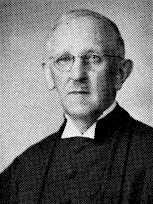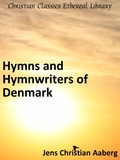J. C. Aaberg
Minister in the Danish Evangelical Lutheran Church in America
Biography
Aaberg emigrated to America in 1901 and went to the small, close-knit Danish-American community in Minneapolis, Minnesota, to join his brother, who was then studying for the ministry at Augsburg College and Seminary. After attending St. Ansgar’s College, and Grand View College and Seminary in Des Moines, Iowa (1904-1908), he was ordained in the Danish Evangelical Lutheran Church in America. He pastored in Marinette, Wisconsin; St. Peter’s Lutheran Church, Dwight, Illinois (1912-1926); and St. Peder’s Lutheran Church, Minneapolis. Until retiring in 1946, Aaberg continued to serve as pastor of St. Peder’s. Over the years he held various offices throughout the Danish Evangelical Lutheran Church in America, and for years after his retirement served a series of congregations around the country as an interim pastor. In 1947 he was honored with the Knight Cross of Denmark from King Frederick for service to Danish-Americans.
Aaberg translated some 80 hymns and songs from Danish to English, and served on committees which compiled several Lutheran hymnals. He began translating hymns in earnest after an incident that occurred while he was in Marinette. A Lutheran bishop from Denmark attended church there one Sunday on a trip to America. In honor of his visit, the Marinette congregation held a special festival worship service. After the service, Aaberg asked the bishop what he thought of the service this little congregation had just held. The bishop replied, "It was so wonderful. It reminded me of the way church services were in Denmark 50 years ago." That comment, meant as a compliment, stirred Aaberg. He concluded that to be vital and living Christian congregations, the Danish-American Lutheran Church must begin to use the language of America, English. Staying strictly with Danish, he believed, the church would become an ever more isolated backwater of nostalgia for the past. He began the work of creating and publishing translations. A hymn translation committee was formed, consisting of Aaberg and three other like-minded pastors. They met some opposition and unhappiness toward their translating work. Some within the church felt that by translating these hymns to English, the translators were hastening the day when the Danish Lutheran traditions would be lost. But the work went forward, through the years between the World Wars, until most of the treasured hymns had been translated to English.
-- hymntime.com/tch
